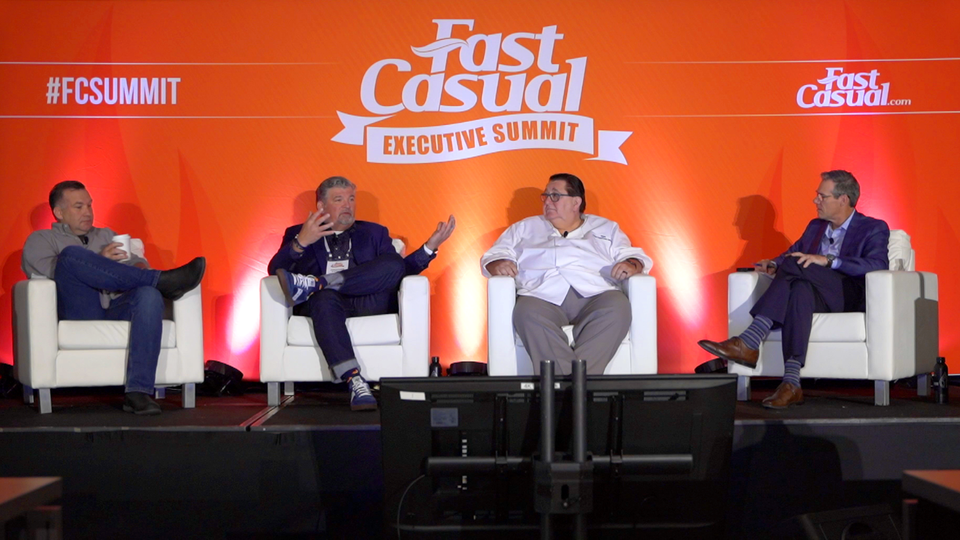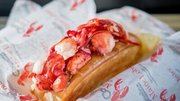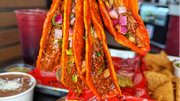Fast Casual Executive Summit
Restaurant execs talk surviving, thriving through the pandemic
Three restaurant executives discussed how the pandemic affected their business during the Fast Casual Executive Summit in Charlotte, North Carolina.

November 4, 2021 by Mandy Wolf Detwiler — Editor, Networld Media Group
The COVID-19 pandemic hit restaurants hard, and those effects have been long lasting. From the mass exodus of staff to supply chain issues, the pandemic is still making its mark on the restaurant industry.
Three industry executives discussed their operations during a panel talk, "Not Only Surviving, But Thriving Through the Pandemic," at the recent Fast Casual Executive Summit in Charlotte, North Carolina. The annual event was well attended, according to organizers. The summit is one of several foodservice and technology industry events run by Networld Media Group. A virtual event, #QSRNext, will take place Nov. 9.
Panelists included: Jack Gibbons, CEO of FB Society; Jonathan Luther, co-founder and proprietor of JJ's Red Hots and Tom Sacco, CEO and president of Happy Joe's Pizza & Ice Cream Parlors and Tony Sacco's Coal Oven Kitchen. Doug Sutton, president of sponsor Steritech, moderated the panel.
How the pandemic hit
"The pandemic has hit us pretty good, but there's hope," said Luther. JJ's Red Hots shuttered two of its three locations during the pandemic but has a robust mobile truck business. The company had two locations in high-business areas and when people worked from home, JJ's Red Hots just didn't have the traffic it needed to keep those two stores open.
"We had to make the tough decision," Luther added. "We laid off a lot of people uptown. We closed that location and thankfully landlords were reeling as well and were where they understood and they worked with us and financially to kind of lessen the burden a little bit. We did have some very tough decisions to make as far as labor went. We wanted to kind of keep our team, but we carried a heavy labor line in our flagship location because we don't want to lose people because we just didn't really know what was going to happen.
"Because we've shrunk from three to one doesn't mean we won't go back to three or 300. The vision is still there. We have a very, very robust following here in the Charlotte area, a very loyal fan base much like pizza. We have a fan base from 8 to 80. … We're thriving. We see business coming back here in Charlotte. It's a very robust economy here. It's growing, even through the pandemic. We kind of see it coming out now."
Check totals are higher and more people are filling the store, Luther said.
Sacco said many of his brand's locations were required to close dining rooms in the early months of the pandemic. Dine-in accounted for 60% to 65% of sales, and that "vaporized," he said. The company was never reliant on third party delivery as it had its own delivery vehicles and some locations have pick-up windows. They didn't have to close any of the stores, but Sacco admits they took a big hit.
"In the first couple of months when we were couponing like crazy just to try to keep sales up," Sacco said. "So what had happened was we were able to move the peace that we had lost with dine in over to the drive thru pickup and to the delivery business. So we were running at that point in time, pretty flush. We never had to close any of the any of the locations. But we did take a big hit. We were never a real big couponing brand because our brand's a premium brand. So that was eroding margin for us in a big way. So we started slowly working back to promoting going back to what the roots of the brand were. Let's push on innovation. Let's push on new product lines and let's slowly wean ourselves off of the couponing."
By November, Happy Joe's had stopped couponing and saw margins bounce back. Dine in now accounts for 15% to 20% of business. Drive through and delivery is up 125% over 2019.
Making it work
Among FB Society's brands area Whiskey Vines, I Declare and Mexican Sugar. Gibbons said they took the opportunity to reorganize the company, take on some new management systems and implement new POS systems.
"We used as an opportunity to really reinvent ourselves and set ourselves up for the next few years," Gibbons said. "And as we were actually shutting down our arm of our catering company, we decided to turn it into a mission-based business. And we had furloughed close to 1500 employees in Dallas. So we ended up taking our catering company and we decided to rebrand it into furlough. Kitchen and furlough kitchen was something that really literally over one evening and a couple of bourbons."
They decided to feed all the furloughed workers in Dallas and then opened the furlough kitchen up to anyone in need of a hot meal.
"We do furlough kitchen pop-ups whenever we have a need arise or a women's shelter that needs help," Gibbons said. "We uses that as sort of our basis to move forward. So that's really how we started to look at the pandemic and how to come out of it a better company."
About Mandy Wolf Detwiler
Mandy Wolf Detwiler is the managing editor at Networld Media Group and the site editor for PizzaMarketplace.com and QSRweb.com. She has more than 20 years’ experience covering food, people and places.
An award-winning print journalist, Mandy brings more than 20 years’ experience to Networld Media Group. She has spent nearly two decades covering the pizza industry, from independent pizzerias to multi-unit chains and every size business in between. Mandy has been featured on the Food Network and has won numerous awards for her coverage of the restaurant industry. She has an insatiable appetite for learning, and can tell you where to find the best slices in the country after spending 15 years traveling and eating pizza for a living.
 ChatGPT
ChatGPT Grok
Grok Perplexity
Perplexity Claude
Claude





